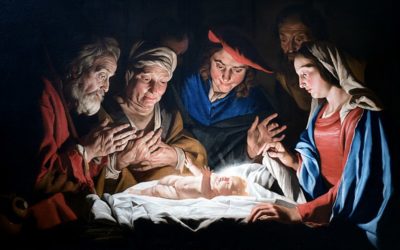The tarring and feathering of Joseph Smith and Sidney Rigdon in March 1832 and Joseph’s trip to Missouri in April to June of that year were followed by a visit to Kirtland, where Joseph and his family eventually decided to relocate. In September, missionaries who had been sent east from Kirtland returned and reported their success. On September 22 and 23, 1832, while Joseph and his family were living in the Newel K. Whitney store, he received the revelation that is today section 84 of the Doctrine and Covenants, an important revelation on priesthood.
For more on the history of this revelation, including how understanding of the priesthood grew over the Church’s first three years, click here.
Zion, the New Jerusalem, and Its Temple
The first five verses of the revelation talk about the city of New Jerusalem, which was to be built in Zion, Jackson County, Missouri, “beginning at the temple lot” (verse 3), which had previously been designated and dedicated (see here and here). The temple, this revelation declared, was to “be reared in this generation” (verse 4). Because of intense persecution, the Lord would later revoke this commandment (Doctrine and Covenants 124:49‒55).
In section 84, the Lord also declared, “For verily this generation shall not all pass away until an house shall be built unto the Lord, and a cloud shall rest upon it, which cloud shall be even the glory of the Lord, which shall fill the house” (verse 5). This prophecy was fulfilled with the construction and dedication of the Kirtland Temple and the events surrounding it. (See Doctrine and Covenants 109‒10.)
Priesthood Line of Authority Back to Adam
Verses 6–16 of section 84 give a priesthood line of authority from Moses and his sons back to Adam. Today, priesthood holders who do not have a copy of their own priesthood line of authority can request one from from the Church.
Verse 17 also explains that the “priesthood continueth in the church of God in all generations, and is without beginning of days or end of years.”
The Greater Priesthood and the Power of Godliness
The “greater priesthood administereth the gospel” (verse 19), meaning it administers in ways that make the atonement of Jesus Christ effective in people’s lives. That includes making it possible someday for those people to pierce the veil and see God personally (Doctrine and Covenants 93:1; 97:16). Receiving a temple recommend from those who hold the greater priesthood and hold the appropriate keys makes it possible to attend the temple, where we learn how to prepare to pass through the veil into the presence of God.
Without this priesthood, these blessings would not be possible in our lives. As section 84 explains, the greater priesthood “holdeth the key of the mysteries of the kingdom, even the key of the knowledge of God. Therefore, in the ordinances thereof, the power of godliness is manifest. And without the ordinances thereof, and the authority of the priesthood, the power of godliness is not manifest unto men in the flesh; for without this no man can see the face of God, even the Father, and live.” (Verses 19‒22.)
Today, we often hear people say that they feel greater spirituality in walking through a forest or climbing in the mountains than in going to church. These places that God has created can indeed be inspiring. But without the ordinances the Church provides through the priesthood, such spirituality cannot lead to eternal life. Wandering in the wilderness just won’t get us where we need to go.
Section 84 gives an example of an entire people who had the opportunity to receive temple blessings but rejected them. Moses “plainly taught to the children of Israel in the wilderness” about the need to be sanctified so they could meet God on the mountain that served as a temple in that ancient day. Moses “sought diligently to sanctify his people that they might behold the face of God” (verse 23). “But they hardened their hearts and could not endure his presence; therefore, the Lord in his wrath, for his danger was kindled against them, swore that they should not enter into his rest while in the wilderness, which rest is the fulness of his glory. Therefore, he took Moses out of their midst, and the Holy Priesthood also” (Verses 24‒25.)
As the Lord said to Moses in the Joseph Smith Translation of the Bible, “Therefore my holy order, and the ordinances thereof, shall not go before them; for my presence shall not go up in their midst” (Exodus 34:1 JST).
The Lesser Priesthood
Having taken from them the higher priesthood with its ordinances that make it possible to enjoy the full blessings of the gospel, the Lord left them with a lesser priesthood.
As section 84 explains, “The Lord confirmed a priesthood also upon Aaron and his seed, throughout all their generations, which priesthood also continueth and abideth forever with the priesthood which is after the holiest order of God” (verse 18). This “lesser priesthood continued, which priesthood holdeth the key of the ministering of angels and the preparatory gospel; which gospel is the gospel of repentance and of baptism, and the remission of sins, and the law of carnal commandments, which the Lord in his wrath caused to continue with the house of Aaron among the children of Israel” (Verses 26‒27.)
This lesser priesthood continued with the Israelites “until John,” the Baptist, “whom God raised up, being filled with the Holy Ghost from his mother’s womb. For he was baptized while he was yet in his childhood, and was ordained by the angel of God at the time he was eight days old unto this power, to overthrow the kingdom of the Jews, and to make straight the way of the Lord before the face of his people, to prepare them for the coming of the Lord, in whose hand is given all power.” (Verses 27‒28.)
Verses 29 explains that the “offices of elder and bishop are necessary appendages belonging unto the high priesthood,” which is why bishops are ordained to the higher priesthood (with an exception later explained in Doctrine and Covenants 107:68‒76). Verse 30 points out that “the offices of teacher and deacon are necessary appendages belonging to the lesser priesthood.”
When Joseph Smith and Oliver Cowdery received the Aaronic priesthood from John the Baptist, they were told it “shall never be taken again from the earth, until the sons of Levi do offer again an offering unto the Lord in righteousness” (Doctrine and Covenants 13:1).
Section 84 provides more information about this prophecy, explaining that “the sons of Moses and also the sons of Aaron shall offer an acceptable offering and sacrifice in the house of the Lord, which house shall be built unto the Lord in this generation, upon the consecrated spot as I have appointed—and the sons of Moses and of Aaron shall be filled with the glory of the Lord, upon Mount Zion in the Lord’s house, whose sons are ye; and also many whom I have called and sent forth to build up my church.” (Verses 31‒32.)
For further information on this prophecy, click here.
The Oath and Covenant of the Priesthood
Verses 33–44 of section 84 include the oath and covenant of the priesthood. Many priesthood holders memorize these verses because of their importance.
This oath and covenant include the promise that those who obtain both priesthoods and magnify them will ultimately receive all that the Father has. There is no greater blessing.
An excellent discussion of the oath and covenant appears in the first chapter of the Duties and Blessings of the Priesthood: Basic Manual for Priesthood Holders, Part B. Joseph Fielding Smith spoke and wrote extensively on the topic. His teachings can be found here. More recently, President Henry B. Eyring gave an excellent talk on “Faith and the Oath and Covenant of the Priesthood.”
The Spirit of Christ
Verses 45–53 of section 84 explain how the Spirit of Christ enlightens everyone who comes into the world, helping them to distinguish truth and light so long as they hearken to that Spirit. Those who reject that spirit find themselves in “the bondage of sin” (verses 50‒51).
The Duty to Testify
In verses 54–61, the Lord corrects the Saints for treating lightly the Book of Mormon and other revelations He has given to them. He calls them to repentance. One way of showing true repentance and retaining a remission of sins is being “steadfast in your minds in solemnity and the spirit of prayer, in bearing testimony to all the world of those things which are communicated unto you” (verse 61). Therefore, every true Saint must also be a missionary.
Signs to Follow Those Who Believe
Verses 62–76 explain the duty to preach the gospel throughout the world and the promise that signs will follow doing so. When miracles do occur, we are not to boast of them.
Lord to Provide for Missionaries
Verses 77–91 give instructions on missionary work. At the time this revelation was given, common hospitality made it possible for missionaries to succeed preaching without purse or scrip, as did the ancient disciples of Jesus.
The Lord also promised to inspire them with what to teach, so long as they prepared through studying the scriptures. Verse 85 directs, “Treasure up in your minds continually the words of life, and it shall be given you in the very hour that portion that shall be meted unto every man.”
Curses on Those Who Reject Testimony
Just as the Lord promised to bless those who accepted the gospel, He likewise decreed curses and plagues on those who rejected it. Verses 92–97 explain this in detail.
The New Song of Zion
In verse 98, the Lord says the day will come when “all shall know me, who remain.” Once that happens, they “shall be filled with the knowledge of the Lord, and shall see eye to eye, and shall lift up their voice, and with the voice together sing” a “new song” whose words appear in verses 99–102. The song describes how the Lord will redeem his people, bind Satan, bring down “Zion from above” (Enoch’s city) and join it with “Zion from beneath” (the New Jerusalem), gathering all things in one and clothing the earth in “the glory of her God,” who will reign personally on the earth. When that occurs, “time is no longer.”
All to Act in Their Duties and Callings
In order to bring this Millennial and celestial glory to pass, every person must do his or her part. Verses 103–10 explain how all can contribute to proclaim the gospel, establish Zion, help the poor, strengthen the weak, and build up the Church.
“Therefore,” the Lord urges, “let every man stand in his own office, and labor in his own calling; and let not the head say unto the feet it hath no need of the feet; for without the feet how shall the body be able to stand? Also the body hath need of every member, that all may be edified together, that the system may be kept perfect.” (Verses 109–10.)
The Abomination of Desolation in the Last Days
The Old Testament prophet Daniel testified that the abomination of desolation would occur twice, once in the meridian of time and again in the fulness of times. At the end of section 84, the Lord instructed Church officers who should travel and who should not (verses 111–14). Those designated to travel were to preach the gospel and warn the inhabitants of the earth “of the desolation and utter abolishment which await them if they do reject these things” (verse 14).
“For if they do reject these things,” the Lord warned, “the hour of their judgment is nigh, and their house shall be left unto them desolate” (verse 15).
The Lord’s servants who could go forth were to do so “reproving the world in righteousness of all their unrighteous and ungodly deeds, setting forth clearly and understandingly the desolation of abomination in the last days” (verse 17).
“For, with you saith the Lord Almighty, I will rend their kingdoms; I will not only shake the earth, but the starry heavens shall tremble. For I, the Lord, have put forth my hand to exert the powers of heaven; ye cannot see it now, yet a little while and ye shall see it, and know that I am, and that I will come and reign with my people.” (Verses 118–19.)
Photo credit for image at top of page: Stock image from depositphotos.com.



